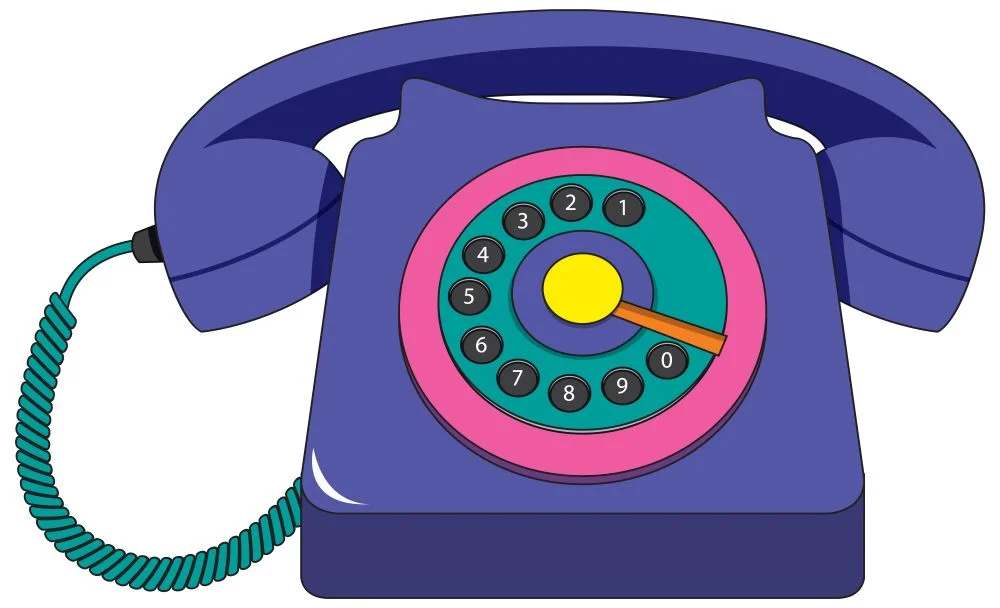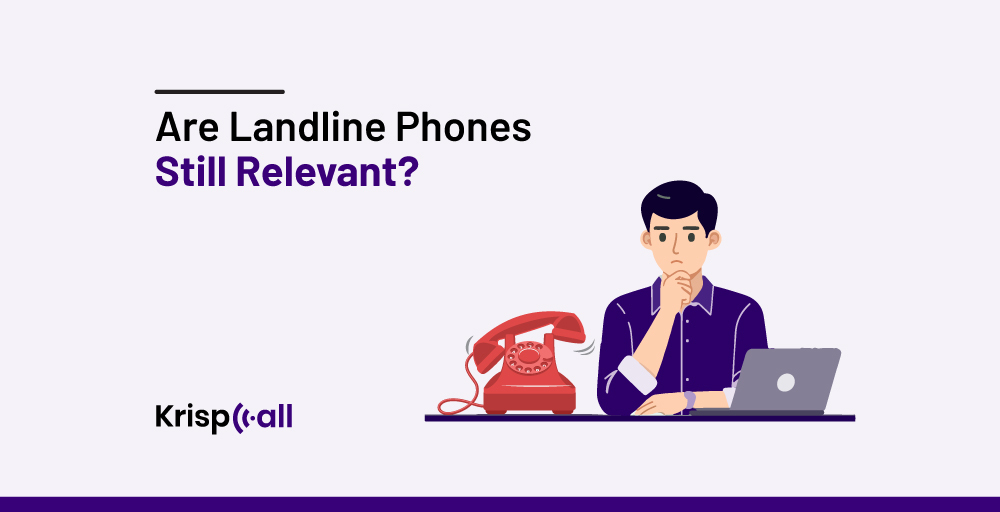Do people still have landline telephones ☎️ in 2024? Is it still relevant to use a landline phone to communicate with friends, family, or business partners?
In an era dominated by smartphones and digital communication, the relevance of landline phones often comes into question. However, many people and businesses, such as healthcare, finance, and legal services, use landlines due to their superior call quality and reliability.
Let’s find out if landline phones are still relevant in 2024 or not in this blog.
🔑KEY SUMMARY
- Landline telephones are still relevant in 2024 because they are reliable, offer good call quality, and can function even during power outages.
- In 2004, almost 90% of US adults had landline phones in their homes, but by 2024, only 30% of people will use landlines.
- Landline telephones are becoming less popular due to limited mobility, heavy maintenance fees, and limited flexibility.
- Businesses such as call centers, hospitals, police stations, and fire departments still rely on landlines due to their reliability, especially during power outages.
- Many businesses are shifting their landline telephones to VoIP and cell phones to communicate.
Are Landline Phones Still Relevant In Modern Days?
Yes, landline phones are still relevant in modern times as they are much more reliable, have better audio, work even during power outages, and mainly don’t rely on internet connections. In fact, a recent survey done by YouGov across 17 international markets revealed that almost 22% of people still use landline phones in their homes. This enduring popularity is due to their steadfast reliability, especially in rural areas with limited internet connectivity.
In emergencies, when every second counts, landline phones are essential. They ensure connectivity when other options may fail. Even today, many startups, small businesses, and outbound call centers use landline phones.
Sectors like government offices, hospitals, and customer service centers depend on landlines for secure and private communication. Unlike mobile phones, which are susceptible to hacking and data breaches, landline connections offer a robust shield against such threats.
In essence, landline phones uphold clear communication standards and safeguard privacy and security. This makes them indispensable for businesses and households alike in the digital age.
Remember the Landline Phones?
You might have remembered a bulky-looking ☎️ phone with lots of wire stuck in between and a rotary dial keypad. That’s what the old landline telephone looked like. Landline phones connect people from one place to another through a global communication network.
Alexander Graham Bell invented the landline phone in 1869 A.D. Over time, landline phones became popular, and every household had a telephone line. By the 1980s, landlines were the primary means of communication in homes and businesses worldwide.

In the late 20th century, cell phones and mobiles 📱 were introduced and became an instant hit. By the early 2000s, cell phones rapidly became the first choice for communication devices. Cell phones broadly became available and affordable, so many people chose to use cell phones. According to the research done by the US Centers for Disease Control and Prevention in 2022, almost 90% of US adults had landline phones in their homes in 2004, but now only 30% of people use landlines.
Similarly, according to the Washington Post data, fewer than a third of landline households had old landline telephone service with copper wire. Most people have VoIP phone ( Voice Over Internet Protocol) service in their homes.
Although typical landline phones with copper wire are fading, VoIP landline phones are becoming increasingly popular. Many businesses and homes are switching to internet-based communication systems due to their cost efficiency and additional features.
Why Landlines are More Reliable?
Landlines are reliable because they operate on a separate infrastructure with copper phone lines. Landlines do not rely on the Internet, so there is less chance of dropped calls, poor and distorted quality, or weak networks. Many other factors make landline phones more reliable;
Infrastructure
Landline reliability lies in its infrastructure. Traditional landline infrastructure includes physical cables, switching centers, and customer premises equipment. These landline phones were installed in a person’s home and connected to a network through copper wire in the tower pole.
Landline phones may be tough to install and maintain, but once you do so properly, they provide the best call quality and experience.
Power Outages
A landline number is much more reliable during power outages or other emergencies in the area. As landline phones rely on different wires and communication service poles, it is impossible to disconnect the landline wire. Even if severe storms and heavy winds occur, they can barely disrupt landline communication services.
Similarly, a landline has a corded line; it doesn’t require electricity, and businesses or people can use a landline without worrying about having electricity.
Clearer Call Quality
One of the main reasons landlines are considered more reliable is that they provide very clear call quality. Many businesses still depend on landline phone numbers due to their clear call quality than any other cell phone.
Landline phones have clear sound quality because they use physical copper wires or fiber optic cables to establish a connection. This wire provides a stable and consistent communication channel.
Less Prone to Dropped Calls
VoIP phones and cell phones 📞 often face the problem of call dropping. If you use a cell phone, a common reason for frequent call drops is a weak signal. But that is not the case with landline phones.
Landline phones have an analog copper wire that directly connects to the public switched telephone network (PSTN). As it transmits audio through the wire, other external factors such as rain, wind, or any signal won’t harm the landline phone. So, there is less chance of your call being dropped if you use landline phones.
What are the Landline Drawbacks and Limitations?
The major drawbacks and limitations of landline phones are its pricey phone bill and lack of flexibility. Due to the advancement of phones and communication, many people prefer calling internationally through their cell phones using an internet connection. With a landline, users can make international calls, but they have to pay a heavy price.
There are several other drawbacks and limitations of landlines that make landlines the least choice for businesses and people.
- Cost: Landline phones are way more expensive 💰 than normal cell phones or VoIP cell phones, especially when you make international calls. In addition, you have to pay an extra price to maintain the phone service and different wires.
- Declining infrastructure: As landline use decreases, the infrastructure supporting them is not being updated or maintained frequently. This can lead to more frequent service interruptions and a decline in the quality of the connection.
- Digital communication platform: Landlines lack integration with modern digital communication platforms such as email, instant messaging, and video calls. This makes them less versatile compared to smartphones and other internet-based communication tools.
- Limited mobility: Landline phones don’t provide mobility like cell phones and other VoIP phones. They are also not as flexible as these new phones and are fixed in specific locations. This is why they do not provide a broader range of services.
- Less appeal to new generations: These days, younger people are more dependent on mobile phones and internet-based communication due to their flexibility and advanced features. As a result, landlines are becoming less popular among the new generation.
- Installation and maintenance: Landline phones are complicated and hard to install due to their wires, devices, and many other things. Installing a landline can be time-consuming and costly. Additionally, you have to maintain landline phones yearly and sometimes monthly.
In a Nutshell: Are Landline Phones Still Relevant & Used?
Landline phones are less common today but still relevant and used by many businesses. Large corporations and enterprises use landlines for their robust and reliable communication infrastructure. Similarly, the customer service center also uses landlines.
Landline phones can be important for handline calls without interruptions. Police stations and fire departments rely on landlines due to their reliability, especially during power outages when cell networks might fail.
However, even after being a reliable connection, landlines are less flexible and advanced than new cell phones and VoIP. These modern phone systems offer flexibility and mobility, which can be the perfect choice for personal and business communication.
Businesses can also adopt new VoIP (Voice over Internet Protocol) technology to communicate with friends, family, and business partners. VoIP providers like KrispCall offer businesses a wide range of choices and features. With KrispCall’s VoIP, you can make easy calls to others. On top of that, businesses can also get features like call transfer, call forwarding, and IVR. With these features, companies can enhance customer service and improve business communication.
FAQ
Do people still use landlines?
Yes, people still use landlines to communicate. However, due to the advancement of cell phones and VoIP phones, only 28% of Americans have a landline at home.
What is one of the biggest Landline downsides?
The biggest downside of landlines is that they are expensive and hard to maintain.
Why are landlines not going away anytime soon?
The landline won’t go any sooner due to its reliability. It doesn’t rely on electricity, is less prone to natural disasters, and provides a clear sound quality.





